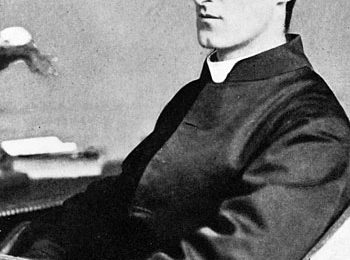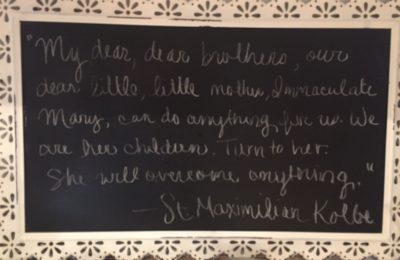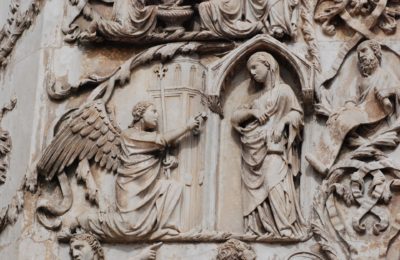As we stroll into the weekend, if you have a weekend; or at least know what is a weekend…
…I am posting a list from Deal Hudson, the editor of The Christian Review, of his 100 Best Catholic Movies Ranked from 1-100. Now, the puritanical leaning among us might start objecting to a list of one hundred movies as an incitement to lounge around all weekend binge watching in front of the telly, but the proper Catholic response is that we can view this list without being triggered into such a decline. Recreation and rest are important to recharging the interior batteries; and, often, watching a well-made movie fits the bill. But, just to reassure you that I am not inventing such a notion, here is St. Francis de Sales reminding us of the importance of such rest and recreation; this is taken from Light and Peace by Carlo Guissepe Quadrupani. By the way, Light and Peace is a compilation of the teachings of St. Francis de Sales (b. 1567- d. 1622); and I am posting today on the remedies to sadness from chapter XV; numbers 4-7 (emphasis added by SCF) are particularly pertinent to this post:
I rejoiced at the things that were said to me: We shall go into the house of the Lord…. Sing joyfully to God, all the earth: serve ye the Lord with gladness…. Why art thou sad, O my soul, and why dost thou trouble me? (Psalms CXXI., XCIX., XLII.)
And God shall wipe away all tears from their eyes. (Apoc. C. XXI., v. 4.)
1. Sadness, says Saint Francis de Sales, is the worst thing in the World, sin alone excepted.
2. It is a dangerous error to seek recollection in sadness: it is the spirit of God that produces recollection; sadness is the work of the spirit of darkness.
3. Do not forget the rule given by Saint Francis de Sales for the discernment of spirits: any thought that troubles and disquiets us cannot come from the God of peace, who makes his dwelling-place only in peaceful souls.
*“Yes, my daughter, I now tell you in writing what I before said to you in person, always be as happy as you can in well-doing, for it gives a double value to good works to be well done and to be done cheerfully. And when I say, rejoice in well-doing, I do not mean that if you happen to commit some fault you should on that account abandon yourself to sadness. For God’s sake, no; for that would be to add defect to defect. But I mean that you should persevere in the wish to do well, that you return to it the moment you realize you have deviated from it, and that by means of this fidelity you live happily in the Lord…. May God be ever in our heart, my daughter…. Live joyfully and be generous, for this is the will of God, whom we love and to whose service we are consecrated.”—Saint Francis de Sales.* (Imitation, B. III., Chap. XLVII.)
4. It is wrong to deny one’s self all diversion. The mind becomes fatigued and depressed by remaining always concentrated in itself and thus more easily falls a prey to sadness. Saint Thomas says explicitly that one may incur sin by refusing all innocent amusement. Every excess, no matter what its … nature, is contrary to order and consequently to virtue.
5. Recreations and amusements are to the life of the soul what seasoning is to our corporal food. Food that is too highly seasoned quickly becomes injurious and sometimes fatal in its effects; that which is not seasoned at all soon becomes unendurable because of its insipidity and unpalatableness.
6. As to the amount of diversion it is right to take, no absolute measure can be given: the rule is that each person should have as much as is necessary for him. This quantity varies according to the bent of the mind, the nature of the habitual occupations, and the greater or less predisposition to sadness one observes in his disposition.
7. When you find your heart growing sad, divert yourself without a moment’s delay; make a visit, enter into conversation with those around you, read some amusing book, take a walk, sing, do something, it matters not what, provided you close the door of your heart against this terrible enemy. As the sound of a trumpet gives the signal for a combat, so sad thoughts apprise the devil that a favorable moment has come for him to attack us. (source)
And, now, back to the list of movies. The list was compiled by Deal Hudson, and prior to posting the list he summarizes his general thinking on what makes a movie a good “Catholic” movie; he writes:
…this is a personal, and somewhat subjective, evaluation, but ranking serves to spur us to think more deeply about what makes a film great and what makes a film Catholic. I agree with Paul Schrader — screenwriter, director, and critic — that greatness in movies can be judged by the following criteria: strangeness, unity of form and content, tradition, repeatability, and morality. To put our finger on the ‘Catholic identity’ of a film is more difficult, but let me try: For a film to be regarded as Catholic, it’s subject matter must engage the mystery of human existence in a way that reflects, either in agreement or disagreement, the Catholic understanding of homo viator, men and women on a journey to God. Thus, a Catholic film will be morally and spiritually significant regardless of the director and his or her professed faith. Although films are often identified as ‘Catholic’ by their explicit engagement with Scripture, saints, or the Church, they must be films that achieve worth as films in order to make this list. Sadly, many films that set out to ‘have a message’ fail when it comes to their artistic values as films. Messages are far more powerful when they are met amid a very well-made film such as those below. (he, then, lists his 100 favorite Catholic movies, source)
I am going to post the list, but first: this week I decided to pick one movie out of the list to watch, at random, and did so, selecting number ninety nine: Frank Capra‘s Lady for a Day which was made in 1933. I found it on You Tube; and, though the formatting was odd, the heads of main characters were often thrown off the screen, I was able to view it without much difficulty. I must say, I was not disappointed. It was simply beautiful, and nearly brought me to tears at several moments, which were abruptly interrupted by Kitty who took such moments to scratch at a new chair, proving what St. Francis de Sales noted: diversion does put an end to sadness; even such delightful sadness that is the result of watching love in action, as in Lady for a Day. And, as Hudson notes in his movie list qualifications: the movie was not overtly Catholic; meaning, it was not about Catholic characters, or situations, but it presented goodness and love in such a manner that the viewer, me, is/was left with sentiments of happiness and joy. As in all good art (well done, Capra!), it inflamed one to think about higher things:
“We have all forgotten what we really are. All that we call common sense and rationality and practicality and positivism only means that for certain dead levels of our life we forget that we have forgotten. All that we call spirit and art and ecstasy only means that for one awful instant we remember that we forget.” ~G.K. Chesterton
But, on to the list. Here it is:
1. Fred Zinnemann, A Man for All Seasons, 1966.
2. Mel Gibson, The Passion of the Christ, 2004.
3. Carl Theodore von Dreyer, The Passion of Joan of Arc, 1928.
4. Krzysztof Kieslowski, The Decalogue, 1988.
5. Robert Bresson, Au Hasard Balthasar, 1966.
6. Roland Jaffe, The Mission, 1986.
7. John Huston, Wise Blood, 1979.
8. Robert Bresson, The Diary of a Country Priest, 1951.
9. Pier Paolo Pasolini, The Gospel According to St. Matthew, 1964.
10. William Friedkin, The Exorcist, 1973.
11. Carl Theodore von Dreyer, Ordet, 1955.
12. Bruce Beresford, Black Robe, 1991.
13. Elia Kazan, On the Waterfront, 1954.
14. Robert Bresson, Mouchette, 1967.
15. John Ford, Three Godfathers, 1948.
16. Mark Pellington, Henry Poole is Here, 2008.
17 Alfred Hitchcock, I Confess, 1953.
19. Alfred Hitchcock, The Wrong Man, 1956.
20. Xavier Beauvois, Of Gods and Men, 2010.
21. Frank Borzage, Strange Cargo, 1940
22. Leo McCarey, Going My Way, 1944.
23. Vittorio De Sica, The Bicycle Thieves, 1948.
24. Fred Zinnemann, The Nun’s Story, 1959.
25. William Wyler, Ben Hur, 1959.
26. Robert Bresson, Pickpocket, 1959.
27. Paul Schrader, First Reformed, 2017*
28. Akira Kurosawa, Ikiru, 1952.
29. Vittorio De Sica, Umberto D, 1952.
30. Ida Lupino, The Trouble with Angels, 1968*
31. Henry King, The Song of Bernadette, 1943.
31. Anthony Harvey, The Abdication, 1974.
32. Robert Bresson, L’argent, 1983.
33. Franco Zefferelli, Jesus of Nazareth, 1977.
34. Jerry London, The Scarlet and the Black, 1983.
35. Wim Wenders, Wings of Desire, 1987.
36. Gabriel Axel, Babette’s Feast, 1987.
37. Frank Capra, It’s a Wonderful Life, 1946.
38. Mel Gibson, Braveheart, 1995.
39. Michael Powell, Black Narcissus, 1947.
40. Maurice Pialat, Under the Star of Satan, 1987.
41. Pavel Lungin, The Island, 2006
42. Alejandro Monteverde, Bella, 2006.
43. John Ford, The Fugitive, 1947.
44. Cecil B. DeMille, King of Kings, 1927.
45. Leo McCarey, Make Way for Tomorrow, 1947.
46. Ermanno Olmi, Tree of the Wooden Clogs, 1978.
47. Liv Ullmann, Kristin Lavransdatter, 1995.
48. Roberto Rossellini, Stromboli, 1950.
49. Richard Fleischer, Barabbas, 1961.
50. Robert Bresson, The Devil Probably, 1977.
51. David Lynch, The Straight Story, 1999.
52. John Patrick Shanley, Doubt, 2008.
53. Terrence Malick, The Tree of Life, 2011.
54. Agnieszka Holland, The Third Miracle, 1999.
55. Philip Groning, Into the Great Silence, 2007.
56. Leo McCarey, The Bells of St. Mary’s, 1945.
57. Martin Scorcese, Silence, 2016*
58. Roberto Rossellini, The Flowers of St. Francis, 1950
59. Joseph Hardy, The Lady’s Not for Burning, 1974.
60. Bruce Beresford, Evelyn, 2002.
61. Denys Arcand, Barbarian Invasions, 2003.
62. Alexander Payne, About Schmidt, 2002.
63. Paolo & Vittorio Taviani, Night of the Shooting Stars, 1982.
64. Ulu Grosbard, True Confessions, 1981.
65. Charles Sturridge & Michael Lindsay-Hogg, Brideshead Revisited, 1981.
66. Francesco Rosi, Christ Stopped at Eboli, 1979.
67. Luis Bunuel, Nazarin, 1959.
68. Alain Cavalier, Therese, 1986.
69. Denys Arcand, Jesus of Montreal, 1989.
70. Krzysztof Kieslowski, A Short Film About Love, 1988.
71. M. Knight Shyamalan, Wide Awake, 1998.
72. Nancy Savoca, Household Saints, 1993.
73. Lee David Slotoff, Spitfire Grill, 1996.
74. Jean-Pierre Dardenne, L’enfant, 2006.
75. Martin Provost, Seraphine, 2008
76. John M. Stahl, The Keys of the Kingdom, 1944.
77. Peter Glenville, Becket, 1964.
78. Luis Bunuel, Simon of the Desert, 1965.
79. Martin Scorcese, The Age of Innocence, 1982.
80. Stijn Coninx, Daens, 1992.
81. Mervyn LeRoy, The Devil of 4 O’Clock, 1961.
82. John Ford, The Informer, 1935.
83. Hugh Hudson, Chariots of Fire, 1981.
84. Patrice Leconte, The Widow of Saint-Pierre, 2000.
85. Jim Sheridan, In America, 2002.
86. Norman Stone, Shadowlands, 1885.
87. Ermanno Olmi, Legend of the Holy Drinker, 1988.
88. Raffaello Matarazzo, The White Angel, 1955.
89. Klaus Haro, Letters to Father Jaakob, 2009.
90. Joe Johnston, October Sky, 1999.
91. John Huston, The Dead, 1987.
92. John Duigan, Romero, 1989.
93. Rodney Bennett, Monsignor Quixote, 1987.
94. Franco Zefferelli, Brother Sun, Sister Moon, 1972.
95. Tommy Lee Jones, The Three Burials of Melquiades Estrada, 2005.
96. Michael Anderson, The Shoes of the Fisherman, 1968.
97. Marta Meszaros, The Seventh Room, 1996.
98. Gordon Douglas, Come Fill the Cup, 1951.
99. Frank Capra, Lady for a Day, 1933.
100. Otto Preminger, The Cardinal, 1963.
*Added to Top 100
Ida Lupino, The Trouble with Angels, 1968*
Martin Scorcese, Silence, 2016*
Paul Schrader, First Reformed, 2017*
**Removed from Top 100
Nicholas Ray, King of Kings, 1961.**
Carol Reed, The Agony and the Ecstasy, 1965.**
Christian Carion, Joyeux Noel, 2005.**
May you have a good day, and a good weekend.
~SCF






